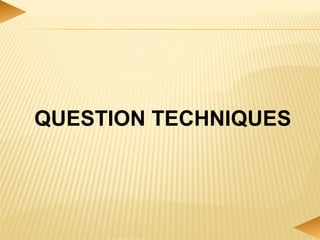Questioning Techniques (Training of Trainers)
- 2. TEACHING QUESTION Teaching questions are used with new information that has not yet been taught They make the learner think and reason out answer based on their experience, observation and information they already have. TESTING QUESTION A testing question tests prior knowledge and recall of information previously given
- 3. USE OF TACHING & TESTING QUESTION INTRODUCTION DEVELOPMENT CONSOLIDATION Some Teaching Some Testing Mainly Teaching Some Testing Only Testing
- 4. BAD QUESTION TECHNIQUE • Unclear Questions • Multiple Questions • Confusing Questions •Guessing Questions •Closed Questions •Answer in Questions
- 6. DIRECT
- 7. OVERHEAD
- 8. REFERAL
- 9. REVERSAL
- 11. WHEN A QUESTION IS ANSWERED INCORRECTLY •Acknowledge Response-Never say: No that is wrong •Rephrase / Recap the question •As for help from other delegates •Give the correct answer, if group cannot respond •Check all learners understand
- 12. WHEN A ANSWER IS PARTIALY CORRECT •Identify the correct part-praise & confirm •Allow the learner to reason the reason the remainder of the answer •Re-phrase if necessary
- 13. WHEN A QUESTION IS NOT ANSWERED Prompt them Rephrase Re-cap if necessary

